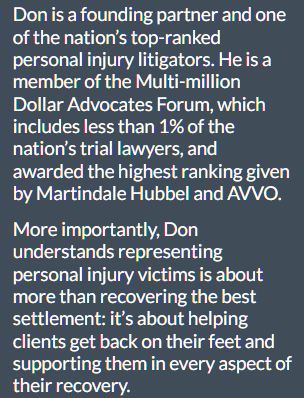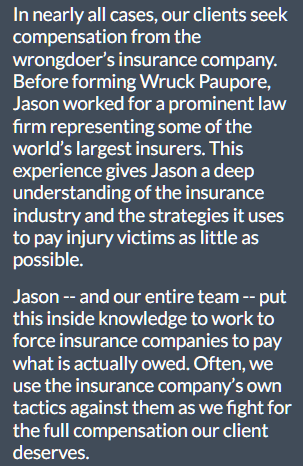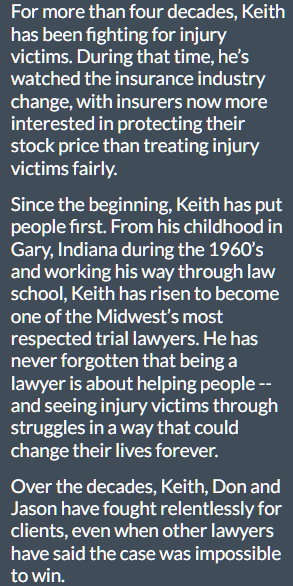





Personal injury lawsuits recover compensation for victims in a variety of different ways. Personal injury plaintiffs in Indiana can obtain an award that accounts not just for their medical costs and lost wages but also for the pain and suffering caused by their injuries.
Damages for pain and suffering address a wide range of harms, including the effects of chronic pain, mental anguish, loss of enjoyment of life, and loss of consortium. While these damages are typically more challenging to calculate, they likely represent a substantial portion of the value of your case and should always be taken seriously.
If you need help identifying how your pain and suffering could be compensated through a personal injury lawsuit in Indiana, we urge you to reach out to Wruck Paupore by calling (219) 322-1166 as soon as possible. To help you get started, we can offer you a free initial case evaluation.
In any personal injury lawsuit, there are two general forms of compensation awards, also known as damages; compensatory damages and punitive damages. Punitive damages are only available in select cases where the defendant’s conduct warrants additional punishment. The main source of recovery in a personal injury lawsuit is through compensatory damages.
Compensatory damages will include monetary remedies for the direct, tangible costs of the injury itself, such as medical expenses and lost wages from missing time at work. However, the potential harms of a personal injury often extend far beyond the economic consequences that the victim suffers. This is where non-economic damages come into play.
Non-economic damages, commonly referred to interchangeably as “pain and suffering” damages, are based on the consequences to the plaintiff that are not based on their loss of money. These more personal harms are wide-ranging and depend just as much on the plaintiff themselves as the injuries sustained.
Even though non-economic damages are not directly calculable like economic damages, they are still substantial and may account for a significant portion of the total compensation package in a personal injury lawsuit. To get a clear picture of how much your case may be worth in light of the pain and suffering that you have experienced and will experience, reach out to your dedicated Indiana personal injury attorney.
Because pain and suffering is defined by specific and personal harms, identifying all the possible theories of awarding damages for pain and suffering is often complex. To make assessing these damages easier, you can often categorize them based on a few key concepts. Our Indianapolis personal injury attorneys have highlighted a few of these concepts below that may help put the types of damages for pain and suffering into perspective.
Some injuries may leave the victim dealing with pain or discomfort even after treatment. In fact, the treatment itself, even if effective, can be the source of the pain. Victims dealing with chronic pain after a personal injury can experience negative effects on their quality of life that may continue long after the treatment is completed or even indefinitely. Chronic pain may also play a role in some of the other theories of pain and suffering discussed below.
Many personal injuries (or the pain resulting from them) may leave the victim unable to engage in activities they had enjoyed prior to the injury. For instance, if a personal injury victim’s injuries prevent them from participating in recreational sports as they had previously, this will be considered when calculating damages. Physical activity is not a requirement in this category. Common examples might include the loss of the ability to travel or read.
Depending on the injury suffered (or its cause), some personal injury victims report the development of certain psychological conditions as a result of their experiences. Common mental hindrances connected to personal injuries include depression, anxiety, and post-traumatic stress disorder. People who suffer from these conditions may face difficulties interacting with the world as they previously had and often require substantial psychotherapeutic treatment to grapple with the consequences.
Loss of consortium is a complicated form of non-economic damages for pain and suffering that often involves the victim’s close, personal relationships. Typically, damages claimed from loss of consortium have to do with the victim’s inability to engage in intimacy. These claims are particularly common in personal injury cases involving dismemberment, disfigurement, or significant scarring. For more information about how loss of consortium or any other theory may influence your potential damages in a lawsuit, reach out to an experienced Hammond, IN personal injury attorney.
Each personal injury lawsuit is as different as the victims that the injury affects. For this reason, it is too difficult to simply guess how much a given case may be worth in non-economic damages without a careful and thorough evaluation of the circumstances.
In many cases, the testimony of experts and other witnesses will be required to explain how the non-economic consequences of the injury have impacted and will continue to affect the plaintiff personally. An assessment of pain and suffering will also rely on the experience of the plaintiff’s legal representation.
This is why it is so critical to have knowledgeable Fort Wayne personal injury attorneys on your side for the duration of your case. This critical source of assistance will allow you to claim a fair amount of damages and evaluate settlement offers effectively.
To get immediate and helpful assistance through a free first-time case evaluation, call the seasoned South Bend personal injury lawyers at Wruck Paupore today at our offices at (219) 322-1166.
Don is a founding partner and one of the nation’s top-ranked personal injury litigators. He is a member of the Multi-million Dollar Advocates Forum, which includes less than 1% of the nation’s trial lawyers, and awarded the highest ranking given by Martindale Hubbel and AVVO.
More importantly, Don understands representing personal injury victims is about more than recovering the best settlement: it’s about helping clients get back on their feet and supporting them in every aspect of their recovery.

In nearly all cases, our clients seek compensation from the wrongdoer’s insurance company. Before forming Wruck Paupore, Jason worked for a prominent law firm representing some of the world’s largest insurers. This experience gives Jason a deep understanding of the insurance industry and the strategies it uses to pay injury victims as little as possible.
Jason -- and our entire team -- put this inside knowledge to work to force insurance companies to pay what is actually owed. Often, we use the insurance company’s own tactics against them as we fight for the full compensation our client deserves.

For more than four decades, Keith has been fighting for injury victims. During that time, he’s watched the insurance industry change, with insurers now more interested in protecting their stock price than treating injury victims fairly.
Since the beginning, Keith has put people first. From his childhood in Gary, Indiana during the 1960’s and working his way through law school, Keith has risen to become one of the Midwest’s most respected trial lawyers. He has never forgotten that being a lawyer is about helping people -- and seeing injury victims through struggles in a way that could change their lives forever.
Over the decades, Keith, Don and Jason have fought relentlessly for clients, even when other lawyers have said the case was impossible to win.


© 2024
Terms of Service | Privacy Policy | Resources | Blog | Sitemap

© 2022 Wruck Paupore PC
Terms of Service | Privacy Policy